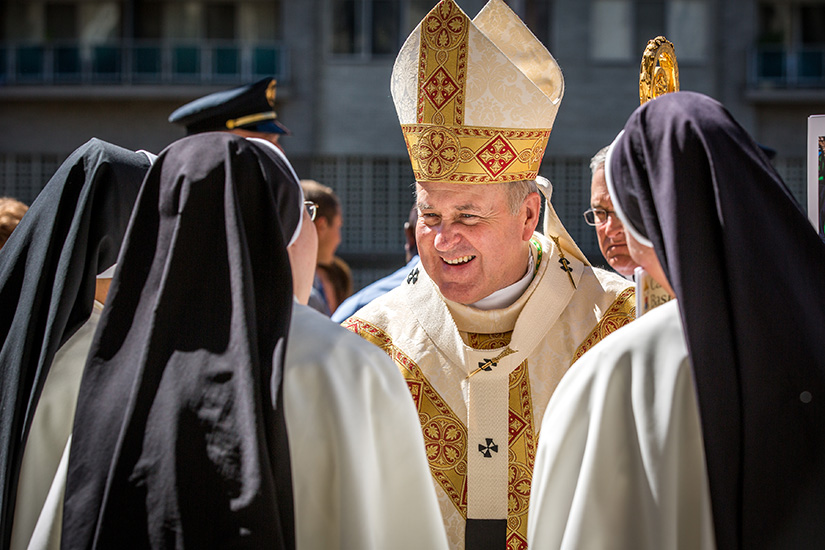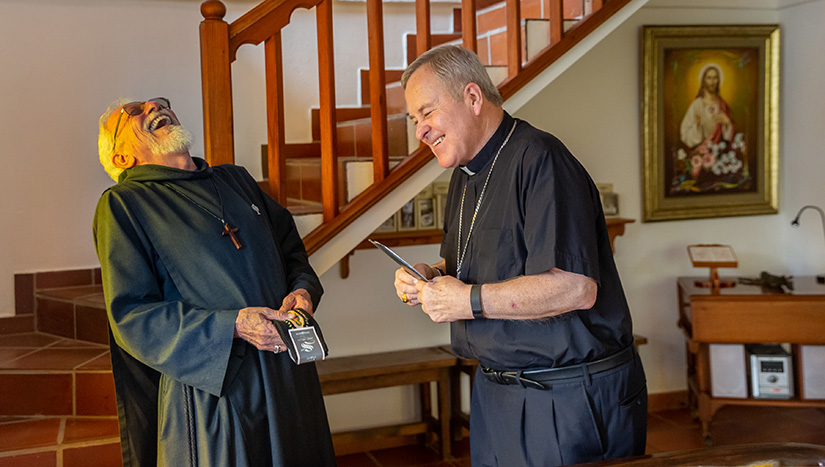Every bishop has an episcopal motto. And that motto says a lot about his character.
Archbishop
Robert J. Carlson’s motto — “Ante Crucem Nihil Defensionis” (“Before
the Cross There is No Defense”) — describes a man who believes he will
have no defense for what he’s done in his life. Quite simply, it means
he must live life to the fullest, because he wants to be ready for the
day he faces the Lord.
 Archbishop Robert J. Carlson spoke with Dominican Sisters of St. Cecilia from the Nashville after the Blue Mass for public safety and law enforcement personnel in 2016.Photo Credits: Lisa JohnstonIn 2019, after leading the Archdiocese of
St. Louis for 10 years, Archbishop Carlson submitted his retirement to
Pope Francis, as all bishops are required to do at age 75. His ministry
now will take a new development as a new bishop is about to be installed
as the leader of the archdiocese.
Archbishop Robert J. Carlson spoke with Dominican Sisters of St. Cecilia from the Nashville after the Blue Mass for public safety and law enforcement personnel in 2016.Photo Credits: Lisa JohnstonIn 2019, after leading the Archdiocese of
St. Louis for 10 years, Archbishop Carlson submitted his retirement to
Pope Francis, as all bishops are required to do at age 75. His ministry
now will take a new development as a new bishop is about to be installed
as the leader of the archdiocese.
St. Louisans who have come know
Archbishop Carlson in the past decade frequently use these words to
describe him: confident, approachable, pastoral, humble, and with a
genuine love for the people. And mixed in with that, a good sense of
humor.
When he left his previous diocese, Saginaw, Michigan, for
St. Louis, he said that he’s always followed a principle — “I’m happy to
stay. I’m happy to go — and that has served me well in my parish
assignments and my work. Sometimes I’m surprised when they ask me to go,
but that’s why I became a priest. You go to a place, the Lord calls you
to someplace else.”
Wherever he goes, he said, “I can do two
things: I can pray for people and I can bring the faith to them. If
those talents are needed, it’s a good match. I don’t pretend to be
anything more.”
Since arriving in St. Louis, Archbishop Carlson
followed through on his promise to listen to people, extend bridges to
those who have left the faith and become active in the community with
other faith leaders. Each year since 2010, he hosted an annual pastoral
assembly as a forum of communication for leaders in archdiocesan
parishes. He also inaugurated The Legatus pro-life prayer breakfast as a
way to get to know the St. Louis community.
Archbishop Carlson
declared Catholic education his first priority in St. Louis. He began
the Mission Advancement Initiative for Catholic education in early 2011,
involving thousands of Catholics across the archdiocese in discussions
and planning to support and strengthen Catholic education.
The
“Alive in Christ” initiative focused on increasing awareness of the
importance of Catholic schools and helping schools increase enrollment
and financial resources. He also established the Roman Catholic
Foundation of Eastern Missouri, which conducted the Beyond Sunday
campaign. It became the most successful capital campaign in the history
of the Archdiocese of St. Louis, raising more than $110 million for
grants, scholarships and other needs of the Church.
Catholic
schools exist, he said, to propagate the faith and as an instrument of
justice, giving people in poverty a chance to move out of poverty and
become successful.
The archdiocese is blessed because the roots of
the faith run deep, the Catholic community is friendly and it is
amazingly generous, he said.
A fervent proponent of
evangelization, he brought in the Catholics Come Home program to welcome
back Catholics who had left the Church and bring in people seeking to
learn more about the Catholic faith.
Archbishop Carlson said the
two programs complemented one another. “The Church always evangelizes,”
he said. Every Catholic must join in that important work “to give
witness to the person of Jesus Christ.”
Throughout his episcopacy,
he wasn’t afraid to speak out on moral issues, including abortion and
religious liberty, explaining that as a moral leader in the secular
world the Church is more and more in conflict with what the culture
believes. He gave an impassioned speech at a rally for religious liberty
in Jefferson City in 2012. In all the dioceses that he led, he
established a special fund to support women in crisis pregnancies.
Referring
to the racial divide in St. Louis that became so apparent after the
shooting death of Michael Brown in Ferguson in 2014, Archbishop Carlson
called for a dialogue, adding that “we have to be able to listen to each
other and also hear each other.”
He did that himself, for example
meeting with 20 juniors and seniors from Cardinal Ritter College
Preparatory High School, which serves the African-American community. He
said he heard their fears and anxieties.
Archbishop Carlson also
said that among the joys of his ministry was accompanying seminarians as
they discern the priesthood. He’s been an ardent supporter of vocations
to the priesthood, permanent diaconate and religious life. When he
arrived, Kenrick-Glennon Seminary had 115 men enrolled, a number that
continues to rise. The seminary was expected to have 140 men enrolled
for the 2020-2021 year. On top of that, Archbishop Carlson has ordained
52 men as priests for the archdiocese since his arrival in 2009.
Of
course, his ability to share relatable stories, mixed with a sense of
humor, have become a notable part of his episcopacy here. When he was
introduced to staff members of agencies and offices of the archdiocese
at a media conference at his arrival in 2009, he noted that St. Louis
would be the fourth diocese he served in since becoming a bishop.
“I’ve had a really hard time keeping a job, so thank you for taking me in,” he quipped.
Life
A
native of Minneapolis, Archbishop Robert J. Carlson was born June 30,
1944, to Robert Sr. and Jeanne Dorgan Carlson, the oldest child and only
boy in the family. The family included two daughters, as well as two
daughters who died in early childhood. Archbishop Robert J. Carlson laughed with Msgr. Luis Mesa on a visit to the Messengers of Peace Community in Colombia, founded by Msgr. Mesa with the support of Archbishop Carlson.Photo Credits: Lisa Johnston
Archbishop Robert J. Carlson laughed with Msgr. Luis Mesa on a visit to the Messengers of Peace Community in Colombia, founded by Msgr. Mesa with the support of Archbishop Carlson.Photo Credits: Lisa Johnston
The Carlson family lived
primarily in the Minneapolis-St. Paul area during the archbishop’s
childhood, although briefly living in Chicago. He attended Christ the
King School and Annunciation School in Minneapolis and Cretin High
School in nearby St. Paul, Minn., graduating in 1962. He attended St.
Paul Seminary in St. Paul, earning a bachelor’s degree in philosophy in
1966 and a master of divinity degree in 1976.
Archbishop Carlson was ordained to the priesthood on May 23, 1970, by then-Archbishop Leo C. Binz of St. Paul and Minneapolis.
As
a young priest, then-Father Carlson was parochial vicar at St. Raphael
in Crystal, Minn., 1970-72, and at St. Margaret Mary in Golden Valley,
Minn., 1972-74. While there he also served as administrator, 1974-76,
until he was named vocation director and vice chancellor in 1976. In
1977 he began graduate studies at Catholic University of America, where
he earned a licentiate in canon law in 1979.
After returning to
the Archdiocese of St. Paul and Minneapolis, he was appointed
chancellor, serving from 1979-85. During this time, from 1980-84, he was
pastor of St. Leonard in Minneapolis.
On Nov. 19, 1983, he was
named auxiliary bishop of St. Paul and Minneapolis, choosing for his
episcopal motto “Ante Crucem Nihil Defensionis” or “Before the Cross
There is No Defense.” He was ordained bishop on Jan. 11, 1984, at the
age of 39.
Then-Bishop Carlson was named coadjutor of the Diocese
of Sioux Falls, S.D., on Jan. 13, 1994, and succeeded Bishop Paul V.
Dudley as the seventh bishop of Sioux Falls on March 21, 1995. Less then
10 years later, he was named Bishop of Saginaw on Dec. 29, 2004,
installed as its fifth Bishop on Feb. 24, 2005 by Archbishop Gabriel
Montalvo, Apostolic Nuncio to the United States of America.
He was
named Archbishop of St. Louis by Pope Benedict XVI on April 21, 2009,
the ninth archbishop and the 10th bishop of St. Louis since its
establishment as a diocese in 1826. He was installed as archbishop of
St. Louis on June 10, 2009.